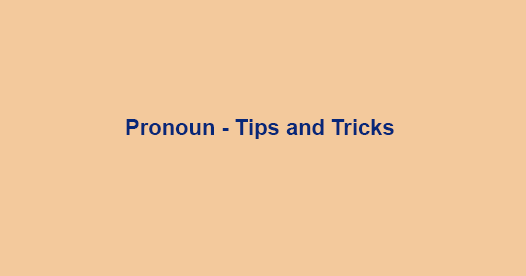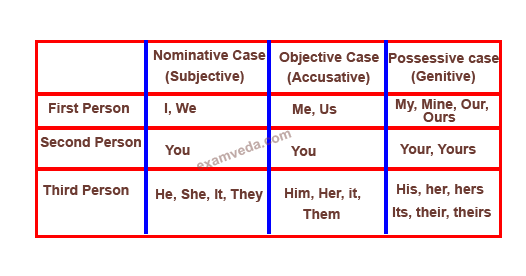
Pronoun
A pronoun is used in place of a noun or nouns.
Personal Pronoun
I, we, you, he, she, it, they are called personal pronouns because they stand for the three persons.
i.The person speaking (I, We)
ii.The person spoken to, and (You)
iii. The person spoken of. (He, She, it, They)

Pronouns are used so that our language is not cumbersome with the same nouns being repeated over and over in a paragraph.
Subject Pronoun: (Subjective case)
(I, we, you, he, she, it, they)
Example: She is at work.
’She’ is main subject of the sentence, hence in the sentence, ‘She’ is the subjective personal pronoun.
Objective pronoun (objective case)
Example: He will meet us later.
‘Us’ is the objective personal pronoun, as it is the object of the verb ‘meet.’
Possessive pronoun (possessive case)
Example:That is our clubhouse.
‘Our’ shows the possession of the object ‘clubhouse’.
Gender
Example: He went to the market.
He is used for male gender.
Other examples - (his, him, he etc.)
Example: She is doing the laundry.
‘She’ is used for female gender.
(Her, hers, etc.)
Example: It is important to them.
‘It’ is gender neutral as it shows an object,
‘Them’ is also gender neutral as ‘Them’ can consists of both genders.
Others gender neutral pronouns are - (Their, they, its.)
Number
Singular Pronoun - where the pronoun is only referring to one specific Noun.
Example: That book belongs to me.
Plural Pronoun - where the pronoun is used to refer to a number of nouns.
Example: That is Their book, not yours.
Reflexive Pronoun
“They are object pronouns that we use when the subject and the object are the same Noun.”
Example: I told myself not to bet all my money on one horse.
Example: The robber hurt himself chasing me through the alley.
“Reflexive pronouns are those which are used to indicate a noun which has been used in an earlier part of the same sentence.
(myself, themselves, yourself, ourselves, herself, himself, itself.)
Example: She blamed herself for the accident.
He injured himself today.
Emphatic or Intensive Pronoun
“These pronouns are used to emphasize a Noun or pronoun.
(myself, himself, herself, themselves, itself, yourself, yourselves and ourselves.)
Example: He himself is his worst critic.
“These pronouns act as appositives of nouns or pronouns for the sake of emphasis,”
Example: You yourself wrote those words.
This request came from the employee themselves.
They themselves know that the Prank was in bad taste.
Avoid reporting things that you yourself haven’t witnessed.
Demonstrative Pronoun
“Demonstrative pronouns are used to show or identify one or a number of nouns that may be far or near in distance or time.
They are only four in number (This, that, these, those)
This, that are called Singular demonstrative pronoun
These, those are called Plural demonstrative pronouns.
Example: That is a beautiful house.
They can also be used to show an unspecified quantity in a sentence.
Example: These were made by me.
(These is showing an unspecified quantity of something that was made by a person.)
Example: Everyone remembers those days.
(Those is showing a particular time or period of days in the past, it is being used in place of a noun that could be - school, summer, college etc.)
Example: This is what he is charging.
This is used as pronoun in place of a number.
These pronouns point out someone or something.
They are identical in form to demonstrative adjective/determiners.
The difference is that -
• A demonstrative pronoun stands alone (because it is a substitute for a noun or noun phrase)
• But a demonstrative adjective is accompanied by the noun it modifies.
Example: She gave me this gift.
(This - demonstrative adjective)
I like this.
(This - demonstrative pronoun)
(More example of demonstrative pronoun)
These are my children.
That is a good idea.
The streets of Delhi are more crowded than those of Mumbai.
Indefinite Pronoun
“These pronouns do stand for some person or thing, but we don’t know for exactly whom.”
When we say, “somebody stole my watch.”
(We don’t know to whom the word ‘somebody’ refers to. The word ‘somebody’ is an indefinite pronoun.
Example: One should speak the truth.
Somebody immediately called the doctor.
Anybody can solve this problem.
Nobody was present.
Many are called, but few are chosen.
Do good to others.
(Few, all, some, none, everything- indefinite pronouns)
Distributive Pronoun
“These Pronouns refer to individual elements in a group or a pair, one individual at a time.”
Example:
Each of the boys gets a prize.
Either of these roads leads to the railway station.
Either of you can go.
Neither of the accusations is true.
You may bring any of your friends.
None of our students failed last year.
Each, either, neither are called distributive pronouns because they refer to persons or things, one at a time.
Eachis used to denote every one of a number of persons or things taken singly.
Either means the one or the other of two.
Neither means not the one nor the other of two.
It is negative of either.
Either and Neither should be used only in speaking of two persons or things.
When more than two are spoken of (Any, No one, and none) should be used.
Reciprocal Pronoun
Each and one really belong to the subject, Other and another are objects, but Each other and one another have become compound pronouns, (and are called reciprocal pronouns) and are rarely separated even by a preposition)
Example: The brothers quarreled with each other.
They all gave evidence against one another.
Jamie and Jack always sit beside each other in break.
They haven’t seen one another since last year.
Relative Pronoun
These pronouns are used to connect a clause or phrase to a noun or pronoun.
These are: who, whom, which, whoever, whomever, whose, whichever and that.
The driver who Ran the stop sign was careless.
Which and that are generally used for objects.
Who and whom are used for people and whose is used to show possession.
Example: She will choose the color which looks good on everyone.
She is complaining to whoever she comes across nowadays.
There is a car in the parking lot that someone has painted a bright pink.
Is there anyone here whose mobile phone has a signal?
I met Hari who had just returned.
I have found the pen which I lost.
There is the book That you lent me.
Interrogative Pronoun
Who, whom, which and what are interrogative pronouns as they are used to ask questions about a person or object that we do not know about.
Compounds of these words are made by attaching (-ever) to the words to strengthen the emphasis on the word.
Example: Which one would you like?
What is your Name?
Who will be managing the bullet?
Whom did you tell about this?
Whoever could have done this?
Whichever one will you choose?
‘Who’ is always the subject of the verb.
‘Whom’ is never the subject of the verb.
It is object of the verb.
It is used to show the person to or for whom the action is being done.
whom were you meeting with?

Join The Discussion